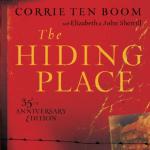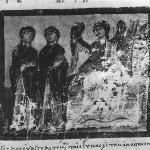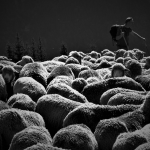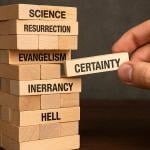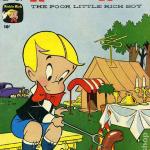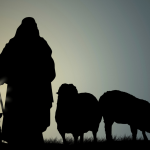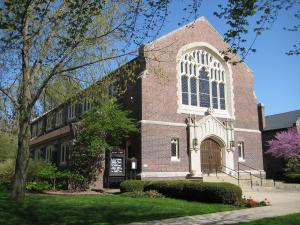 This year marks fifty years since my college graduation. I am astonished at this number, since those years in many ways seem not that long ago. But a half-century it is, and I volunteered to make a brief speech at the event in partial celebration that I have lived so long and that I am still capable of standing on my feet and talking about anything at all. I have entitled my brief address “Jacob at the Jabbok River and John at the Railroad Tracks.” If you read your Bible, you will recognize the reference to the patriarch Jacob and his wrestling match with the mysterious man at the stream of the Jabbok in the book of Genesis. The train track reference is to a train track that splits my Grinnell College alma mater right in two, and that struck me as a perhaps slightly stretched analogue to Jacob’s strange confrontation in the biblical story. As he encountered something that would change his life, so I at Grinnell encountered persons that altered me, too. So, here is a form of the speech I gave last week.
This year marks fifty years since my college graduation. I am astonished at this number, since those years in many ways seem not that long ago. But a half-century it is, and I volunteered to make a brief speech at the event in partial celebration that I have lived so long and that I am still capable of standing on my feet and talking about anything at all. I have entitled my brief address “Jacob at the Jabbok River and John at the Railroad Tracks.” If you read your Bible, you will recognize the reference to the patriarch Jacob and his wrestling match with the mysterious man at the stream of the Jabbok in the book of Genesis. The train track reference is to a train track that splits my Grinnell College alma mater right in two, and that struck me as a perhaps slightly stretched analogue to Jacob’s strange confrontation in the biblical story. As he encountered something that would change his life, so I at Grinnell encountered persons that altered me, too. So, here is a form of the speech I gave last week.
A half century ago, I left Grinnell College, degree in hand, with words from Barry Commoner, a prescient environmentalist of the past, still ringing in my ears, and went to Texas to continue my education at a theological school. That was a decidedly odd move. I had not been raised in the church at all, and had little notion of what a school of theology was about. But the woman to whom I have now been married for nearly 49 years announced after several months of dating that—I quote—“I could never marry anyone who was not a Methodist minister.” The call of God grew quite loud in those words, and I dutifully headed to Perkins School of Theology.
Upon arrival there I had to choose some classes to take, yet had no clue what those might be. It was, many will remember, the 60’s, so freedom of choice was in the air. I chose to take the language of Hebrew, because it sure looked funny—that really was the reason. Surprise! After about one month of Hebrew study, I was hooked and just knew I wanted to teach that stuff somewhere, somehow.
In the course of studying Hebrew I ran across the story that names part of my title for today. Jacob, patriarch of Israel, was twin brother with Esau, children of Isaac and Rebekah. I discovered that their names were important. Esau means in Hebrew “Hairy” while Jacob means “Grabber”. Hence, these boys are Hairy and Grabby. Grabby, as his name implies, grabs for everything he can, and generally comes up smelling like a rose, despite his less than ethical methods for success. After a long trip to Haran, the home country, he tricks his uncle out of all of his best livestock and absconds back to Israel with Laban’s two daughters and their two maids and 11 children. But at the stream Jabbok, he alone has a most peculiar encounter. The story says he wrestles with a man all night and supposedly prevails. After the bout ends he announces that he has met God face-to-face and yet remains alive. Nowhere does the story say that his opponent was God, and since Jacob is the Bible’s consummate liar, we ought take what he says with a large grain of salt. He will meet God, I think, but not at Jabbok.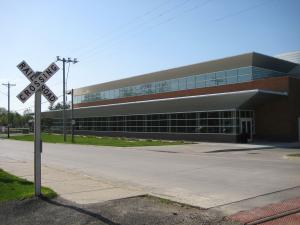
I arrived at Grinnell quite full of myself, imagining that I was ready to demonstrate my grandeur in multiple areas. When Diana and I first met in choir, she judged me the most obnoxious boy she had ever met, and I fear she was quite right. In my Grinnell years I met four Grinnell characters, each of whom shaped me in profound ways, but only three of whom thought they were doing that. The first was Paul Hirsh, member of the Lennox String Quartet in those days, but now living in San Francisco and still teaching at the San Francisco Conservatory of Music. I took his Music Appreciation class in my first year, because I loved music and felt I had a budding expertise in that art. Class began day after day with Hirsh playing the opening measures of Bach’s “Goldberg Variations,” one of the towering achievements of the keyboard repertoire. I came to hate that piece, because it showed me day after day how little I really knew about music and just how difficult musical analysis was for me to grasp. In effect, Hirsh made it all too clear that I was not the hotshot brain I imagined I was, and as a result I received my only Grinnell C+. Like Jacob, I had met my match, and I needed to learn a hard lesson from it.
My second remembrance was Kenneth Christiansen, redoubtable scientist, beloved by many of you, I imagine. I came to prize him, too, but probably not for the reasons many of you did. We had to take a lab science, as you will remember, and I chose biology primarily because I was terrified of chemistry and physics. As I neared the science building, I tended to break out in metaphorical hives, but I hoped to survive biology, at least, ever anxious to run back to classes in poetry as soon as possible.
And then there was the fetal pig in its tray in the afternoon labs. The smell is with me still. I soon mangled mine, poor dear, and called for aid. Christiansen came round to my table, his trimmed Van Dyke beard bending over the slaughtered creature. He then looked at me and said with real emotion, “Oh, that this too, too solid flesh would melt, resolve itself into a dew.” I paused, stunned at the bard’s words in this place, and replied, I hope with similar feeling, “We are such stuff as dreams are made on, and our little life is rounded with a sleep.” Each lab, he and I would exchange quotes from Shakespeare, and that became the reason I survived biology. I learned that knowledge was hardly compartmentalized, that science could gain from poetry and poetry from science. That was a crucial lesson as I moved through the worlds of theology.
The third figure was Don Jones. I sang in his choir, sang many a solo, took four solid years of private vocal lessons with him. In all that time, he said that I sang one note well. Not one song, not several measures, but one note. It was an E-flat, and it must have been a great one, though I was apparently never able to reproduce it. I admit to being crushed in my ambition to become a singer by his harsh judgment, something I had toyed with throughout my Grinnell days. I gave Mr. Jones too much power, allowed him to determine what I could and could not do or be. I learned that I had more control of my life than I thought and needed to assume that control if I were to become a real adult.
Finally, and not in any way least, there was and is Diana, my now wife. We had our first date on Jan. 22, 1966, and have been together since. Well, more accurately, we have been mostly together. After we had been married for about 25 years, she gave me a card that read, “Thank you for 16 wonderful years.” That was perhaps about right. But Diana has been a delightful and challenging and superb companion for all these years,
actually for more than that half-century I mentioned earlier. In fact, Diana brings me back to Jacob.
After Jacob finished his wrestling match with mysterious man at the Jabbok, he discovers that his brother Esau was coming to meet him. It had been 20 years since they had seen one another, and their last meeting had not been a happy one. Jacob had first tricked Esau out of his right as the family first born by trading for it with a bowl of stew, and had stolen the patriarchal blessing from their blind father by pretending to be his brother. Jacob had run for his life after those dastardly deeds, hearing his furious brother breathing threats of murder. Jacob prepares to meet his brother again imagining that his life was about to end on the point of Esau’s sword. He sees Esau rushing down the side of a hill, accompanied by 400 armed men, and expects the worst. The story then says, “Esau ran to meet him, and embraced him, and fell on his neck and kissed him, and they wept.” I daresay they wept for two very different reasons. Esau is amazingly glad to see his rascal brother; Jacob is amazingly glad to be alive. He then says, “Seeing your face is like seeing the face of God, because you have received me with such favor.”
And so it has been for me with Diana. I can readily and truly say, that seeing her face has been just like seeing the face of God, since she has received me with such favor. I thank Grinnell for all that I have learned, and mostly about myself. But most of all I thank Diana who has been for me for a half century the face of God.










